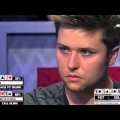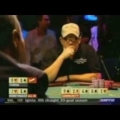The network’s breathless tournament coverage has done no favors for the game’s popularity and legality in the U.S.
The 2013 World Series of Poker Main Event opened to a pastiche of landmark tournament moments from the last decade starting with, of course, Chris Moneymaker’s serendipitous Main Event win in 2003. Moneymaker – a then 27-year-old poker hobbyist with an easy going countenance – won an online satellite tournament for a $10,000 entry fee to the Main Event, then navigated an 839 person field, “eliminating” various heady professional players on his way to a $2.5 million first place payday.
The “Moneymaker Effect” was poker-prozac and ESPN replayed the 2003 Main Event highlights in multiple-hour blocks at all times of day; making it feel like Moneymaker was ousting Las Vegas legends like the Great Johnny Chan, The Great Phil Ivey, and then in a final heads-up duel, the Great Sam Farha hundreds of times over.
The Worldwide Leader in Sports’ continual replays of the event churned a typical short-run happenstance into an iconic event. The odds of winning even a small field tournament are extremely small; over a relatively tiny number of hands, a great deal of luck is involved. However, literature and forum discussion emphasizing both these realities and an understanding of the mathematical, psychological, and logical complexities that made those Las Vegas legends so successful paled in comparison to the massive sample size of ESPN replays of short-run Main Event highlights.
By 2005, ESPN had succeeded in introducing a once cultish game to the mainstream. In doing so, the network provided a delirious combination of escapism and the promise of making exorbitant amounts of cash the proverbial American Way. The coverage drew in a number of online poker sites that ceaselessly promoted their “free play” software during commercial breaks.
That year, the online poker industry had amassed $60-billion in poker wagers with 2.4 billion dollars in reported revenue (up from 82 million dollars in 2001). Consistent with the Moneymaker ethos, bold aggressive moves rife with logical errors paid off handsomely at the online tables. Even insufferably tight players with only a basic understanding of hand values could wait for quality holdings and then let a litany of weak players pay them off with lesser hands or terrible bluffs.
Over the next several years, however, online poker tournaments evolved considerably. Players who had spent countless hours of play making haphazard all-in bets learned the hard way that ESPN highlight style poker was extremely unprofitable. In response, thousands of Americans engaged in public forum discussions on microeconomic skill-based topics like “leveraging” and “expected value maximization,” coaching videos, private coaching sessions and statistical programs that tracked almost every betting frequency imaginable. As every day players became more sophisticated poker thinkers, the game’s skill element became more prevalent.
Although online poker strategy was rapidly evolving, there continued a lingering debate about whether online poker sites could legally operate in the United States as “games of skill.” The Unlawful Internet Enforcement Gaming Act (UIGEA), a U.S. federal law passed in 2006, made it a federal offense for an online gambling site to accept payments “in connection with the participation of another person in unlawful Internet gambling.” The UIGEA did not explicitly cover online poker, an ambiguity which harnessed public debate and litigation about online poker’s status in the United States.
Over the next five years, ESPN did no favors to bridge the necessary gap between poker’s nascent phase in 2003 and its widespread development into a complex if not tedious skill game during the latter half of the decade.
For a network so responsible for the online poker boom, its continual emphasis on short-run, high variance coverage of poker hands – Aces winning one hand and then getting quashed by a bad beat ten minutes later – continually ebbed against strengthening the perception of poker as a game of skill.
ESPN’s World Series of Poker coverage routinely failed to provide by way of non-intrusive info graphics or quick commentary fundamental, skill-based pieces of information. Rarely did the broadcast provide players’ positions and stack sizes, or the tournament’s blind levels. The audience was mostly treated to showdown results, which, whether it is poker, basketball, or finance, is always heavily flavored with luck. And eventually luck runs out.
***
On April 15, 2011, “Black Friday” in the poker world, a federal indictment was unsealed disclosing that the United States Department of Justice had filed a litany of charges against the three largest online poker companies extending real money poker games to United States residents at the time: Full Tilt Poker, Pokerstars, and Ultimate Bet. In addition to charges of bank fraud and money laundering, the Department of Justice accused each company of violating the UIGEA. Based on these charges, the DOJ seized the “.com” addresses of each company; when Full Tilt Poker and Pokerstars pledged not to serve the U.S. market, the DOJ relinquished the domain names so the sites could do business in non-U.S. markets.
In July 2011, only three months after “Black Friday,” ESPN made an interesting play: the network opted for the first time in its broadcast history to provide live hand by hand coverage of the WSOP Main Event featured tables over several days until the Final Table (broadcast live in November) had been reached.
Both the game and drama were organic. Players’ identities were given full autonomy from saturated reality TV gimmicks. For all of ESPN’s regular insistence that heightened moments came from speedy all-in eliminations and table banter, the audience was now able to experience the narrative backdrop behind those moments: the tortuous betting patterns and grinding hours of play that makes a large pot or an all-in moment not just an intense one, but dramatically satisfying.
On one memorable hand two young, razor-sharp tournament professionals – Matt Giannetti and Ben Lamb – jostled for hours, throwing flurries of small bets at each other, moves that would have unhinged a lesser player into making a big mistake much earlier in the day. When the two finally broke their equilibrium of small pots and played a big hand, Gianetti spent ten minutes trying to complete a day-long puzzle and determine whether Lamb’s substantial river bet meant trip twos, or a bluff.
In that moment, ESPN depicted poker as a game of skill and psychological constitution: just one camera focused on a young man, dead tired after six days of making one high strung decision after the next, sitting under the low cackles of chips representing millions of dollars, trying to figure out if one of the trickiest poker players in the world had a powerful hand or a bluff. The players owned the drama and the broadcast analysts quietly recognized this.
According to Cardplayer Magazine’s report in July of 2011, the Main Event live coverage experienced moderate success, scoring a .4 Nielsen rating (415,000 viewers) on ESPN2 and 23 million minutes of online viewing on ESPN3′s internet feed. At the time, ESPN Senior Director John White touted the program’s success.
“This was something the sport needed in order to take the next step,” White said. “We don’t want poker to become stagnant. We want to be very fresh and progressive with our coverage, whether that means updating the featured table sets or increasing the amount of on-air analysis.”
Poker commentator Oliver Busquet had a more revealing, if not sincere, take on ESPN’s live coverage of the Main Event in 2011.
“I’m supposed to cater to the audience,” Busquet reflected. “I didn’t want to dumb down the strategy and analysis for anyone. The hard-core poker fans certainly appreciated it, but even the amateurs could get some value. They either enjoyed it from an entertainment perspective or for the first time ever, they realized just how complex this game could be. This isn’t some random luck-based game played by degenerates and we shouldn’t be afraid to show that to the public.”
Read the rest of this article at http://www.salon.com/2013/09/24/espn_may_have_ruined_poker_in_the_us_partner/







